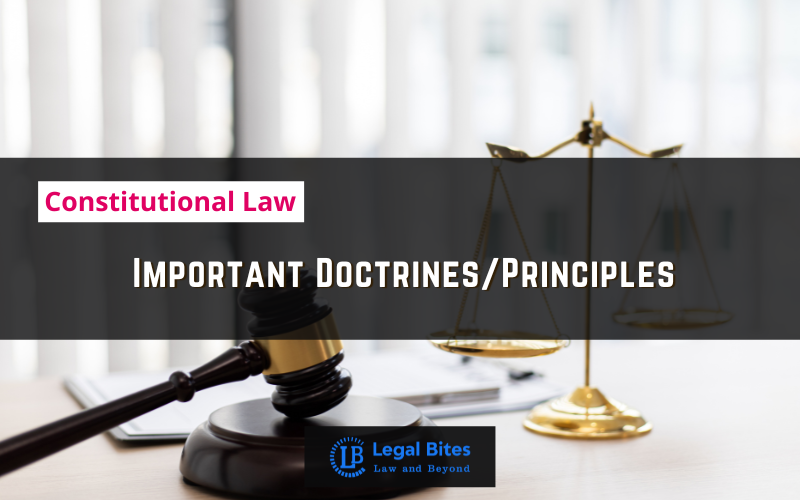Secularism is neither anti-God nor pro-God. It eliminates God from the matters of State and ensures that no one shall be discriminated on the grounds of religion.” In the light of the above observation, discuss the true import of freedom of religion guarantee.
Question: Secularism is neither anti-God nor pro-God. It eliminates God from the matters of State and ensures that no one shall be discriminated on the grounds of religion.” In the light of the above observation, discuss the true import of freedom of religion guarantee. [MPJS 2010] Find the answer to the mains question only on Legal Bites. [Secularism… Read More »
;
Question: Secularism is neither anti-God nor pro-God. It eliminates God from the matters of State and ensures that no one shall be discriminated on the grounds of religion.” In the light of the above observation, discuss the true import of freedom of religion guarantee. [MPJS 2010] Find the answer to the mains question only on Legal Bites. [Secularism is neither anti-God nor pro-God. It eliminates God from the matters of State and ensures that no one shall be discriminated on the grounds...
Question: Secularism is neither anti-God nor pro-God. It eliminates God from the matters of State and ensures that no one shall be discriminated on the grounds of religion.” In the light of the above observation, discuss the true import of freedom of religion guarantee. [MPJS 2010]
Find the answer to the mains question only on Legal Bites. [Secularism is neither anti-God nor pro-God. It eliminates God from the matters of State and ensures that no one shall be discriminated on the grounds of religion.” In the light of the above observation, discuss the true import of freedom of religion guarantee.]
Answer
The present observation was made by the Supreme Court in the case of Ahmedabad St. Xavier’s College v. State of Gujarat [1974 AIR 1389], where it held that Secularism neither means anti-god nor pro-god. It just ensures that no one is differentiated on the basis of religion eliminating the concept of God in matters of the state.
In 1976, by the 42nd Constitutional amendment word ‘secular’ was added to the preamble of the Constitution. India being a secular state is a no-state religion which means that it follows no particular religion. Secularism is a basic feature of the Constitution. It does not require the state to be hostile to religion. While dealing with the concept of ‘secularism’ in detail, the Supreme Court in S.R Bommai v. Union of India [1994 AIR 1918] explained that under the Constitution, secularism does not mean an atheist society but a heterogeneous society providing equal status to all religions without favoring or discriminating against anyone.
Now if we ask what is the meaning of religion then, it is imperative to note here that it is not possible to devise a precise definition of universal application as to what is religion and what are the matters of religious belief or religious practice. Religion is not susceptible to a precise definition but it is only a matter of faith and belief and the Constitution of India guarantees to safeguard the faith and belief of individuals as under ‘right to freedom of religion enshrined under Article 25 to Article 28 of the Constitution.
In this regard, the Supreme Court in its judgment of S.P. Mittal Etc. Etc v. Union of India [1983 SCR (1) 729] ruled that “In the background of the provisions of the constitution and the light shed by judicial precedent we may say that religion is a matter of faith. It is a matter of belief and doctrine. It concerns the conscience, i.e., the spirit of man. It must be capable of expressions in world and dead, such as worship or ritual.”
The Constitution of India contains in its Chapter on Fundamental Rights several provisions that emphasize complete legal equality of its citizens irrespective of their religion and creed and prohibit any kind of religion-based discrimination between them. Among these provisions are as follows:
- The State shall not deny to any person equality before the law or the equal protection of the laws within the territory of India. [Article 14]
- The State shall not discriminate against any citizen on grounds only of religion, race, caste, sex, place of birth, or any of them, either in general or in the matter of access to or use of general and public place and conveniences. [Article 15]
- There shall be equality of opportunity for all the citizens in the matter of employment or appointments under the State and no citizens shall, on grounds only of religion be ineligible for, or discriminated against, in respect of any employment or office under the State. [Article 16]
- The traditional religious concept of ‘untouchability’ stands abolished and its practice in any form is strictly forbidden. [Article 17]
- If the State imposes compulsory service on citizens for public purposes no discrimination shall be made in this regard on the ground of religion only. [Article 18]
Important Mains Questions Series for Judiciary, APO & University Exams
- Constitutional Law Mains Questions Series Part-I
- Constitutional Law Mains Questions Series Part-I
- Constitutional Law Mains Questions Series Part-II
- Constitutional Law Mains Questions Series Part-IV
- Constitutional Law Mains Questions Series Part-V
- Constitutional Law Mains Questions Series Part-VI
- Constitutional Law Mains Questions Series Part-VII
- Constitutional Law Mains Questions Series Part-VIII
- Constitutional Law Mains Questions Series Part-IX
- Constitutional Law Mains Questions Series Part-X



